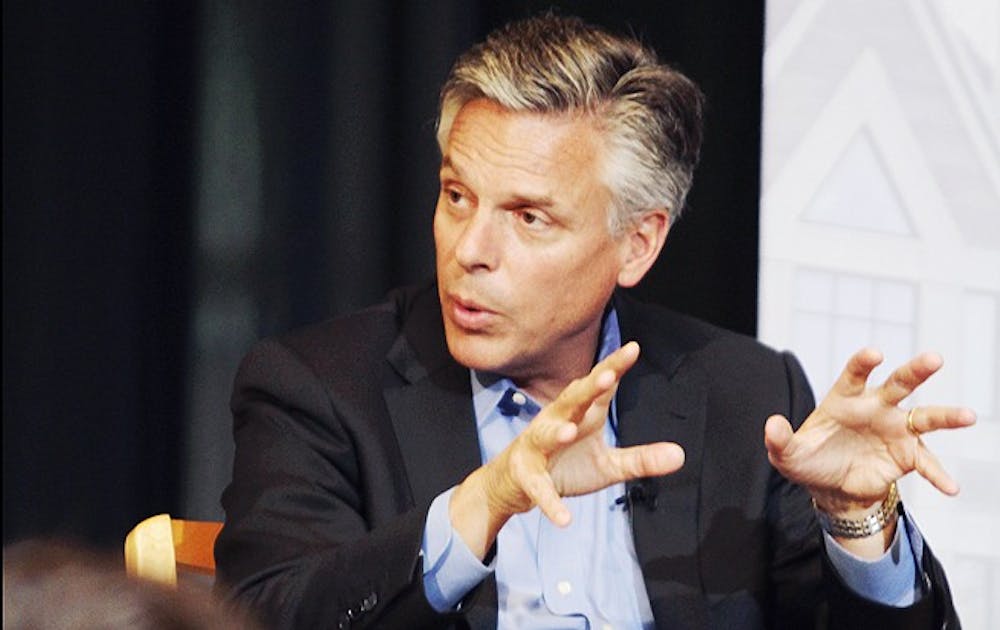GOP presidential candidate Jon Huntsman called on students to pursue public service as he outlined major domestic and foreign policy challenges.
On Thursday April 11, Huntsman, former governor of Utah and former United States ambassador to China, completed the second part of his lecture series, called “Today’s Changing Political Landscape: Foreign and Domestic.” In a conversation held in the Sanford School of Public Policy, Huntsman spoke with Phil Bennett, Eugene C. Patterson professor of the practice of journalism and public policy, about the United States’ relationship with China as well as domestic issues. Huntsman also left a few words of advice for aspiring young leaders, urging students to consider public service as a career.
“You can only put so many words on your tombstone,” Huntsman said. “I’ve noticed... all they care about is what you’ve done to enhance the lives of others, and the only way you do that is through service.”
Huntsman said a person’s legacy is defined by their service and what one does to enhance the life of others. Apart from positive encouragement, he also addressed more tangible issues currently facing the United States.
Regarding foreign relations, Huntsman noted that the most profound misunderstanding between the United States and China is a mutual misunderstanding of each other’s intentions. Huntsman sees, however, tremendous opportunity for growth in relations between the two countries as their economic interests align. China now has the second largest economy in the world, and since economic successes are highly linked to party legitimacy, Huntsman noted that China is taking its economic actions into serious consideration.
One major consideration is the pivot of China’s economy toward a consumption model, one that the country’s administrators have struggled to accommodate.
“They’ve got to stimulate commerce and investment in the future, which means you have to convince the average citizen that now is the time to take out money from under the mattress,” Huntsman said. “In order to do that, you have to have social safety nets.”
Along with these economic obstacles, China currently faces a major challenge in terms of accepting the responsibilities of a global leader, a role with which it is still unfamiliar, Huntsman said. For example, China has not been forced into a position where it must take sides in tough international disputes, and although those situations may present China with significant challenges, they also offer many opportunities for the growing country.
Domestically, Huntsman said there was a clear lack of healthy community conversation regarding important topics such as immigration and gun control.
Regarding the Newtown, Conn. shooting, Huntsman spoke respectfully of President Barack Obama’s response but emphasized the need for a roundtable conversation with representation from Second Amendment supporters and mental health experts.
Huntsman indicated that the lack of lobbyists for mental health interest groups not only makes public funding for mental health programs more susceptible to budget cuts, but also incurs the social consequences of neglecting the needs of this interest group.
At the structural level, Huntsman pointed to fundamental problems present in American society that may dim the country’s prospects as foreign powers like China threaten to surpass U.S. economic performance in the near future. He said that such attitudes could be unhealthy for domestic confidence.
“To see another country crawl closer and closer to where we are is frightening,” Huntsman said. “[It] gives us a sense of disparity.”
Huntsman believes that finding a solution to all these problems must begin with having an optimistic leader with a strong and insightful strategy. Only a president with the mandate of the people—one who can deliver issues in a uniform and effective way to Congress—can serve this role, he said.
Huntsman called upon students to be public servants, even amidst a volatile political arena. Having been raised in a family driven by social impact, Huntsman promoted service and problem solving as agents of real growth. Furthermore, Huntsman urged students to remain positive.
“Don’t let cynicism invade your brain,” Huntsman said. “Stay focused on the positive aspects of our nation’s balance sheet, and dedicate your life to service and problem solving.”
He told the audience to appreciate just how fortunate they are to be studying at an elite institution like Duke. Huntsman said that the Duke network is valuable tool for Duke graduates, who are incredibly capable of propelling social change, he said. Following the talk, both professors and students spoke positively about the event.
“It was a marvelous talk, as would be expected of Jon Huntsman,” said Patrick Duddy, diplomat-in-residence and former United States ambassador to Venezuela. Anand Raghuraman, a sophomore, said Huntsman’s tone was very appropriate for the topic.
“He has a way of disagreeing with you without being disagreeable,” Raghuraman said.
Get The Chronicle straight to your inbox
Signup for our weekly newsletter. Cancel at any time.

